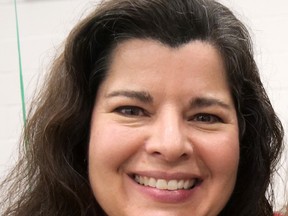Do not hesitate to reach out to the Alzheimer Society

Article content
The Alzheimer Society is encouraging anyone concerned about having Alzheimer’s, or someone they care about possibly having the disease, to reach out.
Do not be apprehensive about contacting the Alzheimer Society, said Shelley Green, executive director, Alzheimer Society of Oxford.
“That is exactly why we are here – to support people,” said Green. “And we’re supporting people from before diagnosis until after death. Do not hesitate… make that phone call.
“We talk to a lot of people who are concerned who have not had a diagnosis, maybe even haven’t talked to a doctor about it yet. Sometimes they just want to talk about the concerns that they have and to know whether or not they should be talking to their doctor. If you are concerned about somebody, oftentimes it takes a lot of different encouragements for people to take that step.”
Reaching out can be stressful, she said, and sometimes difficult to say ‘I think I’m having problems with my memory,’ or ‘I’m concerned about my partner… or parents.’
“What we want people to know, first of all, is that our services are completely confidential. Our staff are very professional. And they are very sensitive.”
The aim is to make people feel comfortable, once they start talking, and glad they called.
“We want our community to know that we’re here to help them,” said Green. “We’re here to support them, we’re here to provide education.”
There is a volunteer companion program, she noted, social interaction through a recreation program, and support groups and individual support available.
“We have such a wide range of programs now, going from before diagnosis until after death. People do not need to go through dementia on their own, that’s exactly why the Alzheimer Society exists.”
Since last March, COVID-19 has stopped in-person services but most programs continue either by phone or virtually (online).
“A lot of our individual support services in the past were done over the phone. For some people in-person services are better, but we will absolutely do our very best to support whoever reaches out to us – even through COVID. Our fabulous staff have really turned the services we have into virtual and phone services.”
A manual (Together Apart) was created for the volunteer companion program as a guide to visiting at a distance.
“I’m really proud of that piece,” said Green. “It was a big piece of work, but it was well worth it.”
The three-section manual covers communication, using Zoom software, and activities.
“In the Zoom section, we lay it out if you’re using a tablet, phone, laptop or desktop. So we’ve really gone into a lot of detail.”
The Together Apart manual can be helpful for anybody (download a free version from https://alzheimer.ca/oxford/en/home) learning how to use the technology.
“If you have a family member living with dementia and you want to be able to talk to them, do some activities with them, that manual is a great support.
“After we started developing the manual, I quickly realized that this would be great for all of our clients, and for people in a long term care facilities. We did that fairly early on in COVID so that our volunteer companions could move their visits in-person to visiting virtually or over the phone.”
Since March 2020 many people have learned what it feels like to be isolated, said Green.
“We want people to know that when people are living with dementia, they experience dementia regularly (without COVID). Oftentimes, because of abilities that are changing, the person might start to retreat socially, but also family members and friends can start to retreat and not be in contact because they don’t know what to say or they’re not comfortable. That’s what we’re here for – to educate people so they can become more comfortable spending time with people with dementia… what to say and how to respond to things, and having the understanding so you can continue a friendship or relationship.
“We’re really hoping that will spur people on to maybe have a greater sensitivity. Hopefully people will reach out to the care partner as well as the person with the diagnosis to offer friendship, support, to check in. You can spend time with the person living with dementia, virtually, to give the care partner a break. Even if the care partner is staying at home, you could give them an opportunity to just go have a cup of tea, and not have to be concerned about the safety of the individual with dementia while they are visiting somebody virtually.”
If you would like to volunteer with the Alzheimer Society, or donate, the Oxford branch can be contacted at 519-421-2466.
cabbott@postmedia.com
Postmedia is committed to maintaining a lively but civil forum for discussion. Please keep comments relevant and respectful. Comments may take up to an hour to appear on the site. You will receive an email if there is a reply to your comment, an update to a thread you follow or if a user you follow comments. Visit our Community Guidelines for more information.